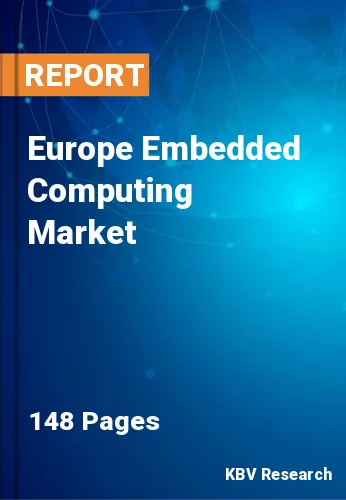Chapter 1. Market Scope & Methodology
1.1 Market Definition
1.2 Objectives
1.3 Market Scope
1.4 Segmentation
1.4.1 Europe Embedded Computing Market, by Component
1.4.2 Europe Embedded Computing Market, by End User
1.4.3 Europe Embedded Computing Market, by Country
1.5 Methodology for the research
Chapter 2. Market at a Glance
2.1 Key Highlights
Chapter 3. Market Overview
3.1 Introduction
3.1.1 Overview
3.1.1.1 Market Composition and Scenario
3.2 Key Factors Impacting the Market
3.2.1 Market Drivers
3.2.2 Market Restraints
3.2.3 Market Opportunities
3.2.4 Market Challenges
Chapter 4. Competition Analysis - Global
4.1 KBV Cardinal Matrix
4.2 Recent Industry Wide Strategic Developments
4.2.1 Partnerships, Collaborations and Agreements
4.2.2 Product Launches and Product Expansions
4.2.3 Acquisition and Mergers
4.3 Market Share Analysis, 2023
4.4 Top Winning Strategies
4.4.1 Key Leading Strategies: Percentage Distribution (2020-2024)
4.4.2 Key Strategic Move: (Partnerships, Collaborations & Agreements: 2020, May – 2024, Nov) Leading Players
4.5 Porter Five Forces Analysis
Chapter 5. Europe Embedded Computing Market by Component
5.1 Europe Software Market by Country
5.2 Europe Hardware Market by Country
5.3 Europe Embedded Computing Market by Hardware Type
5.3.1 Europe Microcontroller (MCU) Market by Country
5.3.2 Europe Microprocessor (MPU) Market by Country
5.3.3 Europe Digital Signal Processor (DSP) Market by Country
5.3.4 Europe Other Hardware Type Market by Country
Chapter 6. Europe Embedded Computing Market by End User
6.1 Europe Consumer Electronics Market by Country
6.2 Europe Communications Market by Country
6.3 Europe Industrial Market by Country
6.4 Europe Automotive Market by Country
6.5 Europe Healthcare Market by Country
6.6 Europe Energy Market by Country
6.7 Europe Other End User Market by Country
Chapter 7. Europe Embedded Computing Market by Country
7.1 Germany Embedded Computing Market
7.1.1 Germany Embedded Computing Market by Component
7.1.1.1 Germany Embedded Computing Market by Hardware Type
7.1.2 Germany Embedded Computing Market by End User
7.2 UK Embedded Computing Market
7.2.1 UK Embedded Computing Market by Component
7.2.1.1 UK Embedded Computing Market by Hardware Type
7.2.2 UK Embedded Computing Market by End User
7.3 France Embedded Computing Market
7.3.1 France Embedded Computing Market by Component
7.3.1.1 France Embedded Computing Market by Hardware Type
7.3.2 France Embedded Computing Market by End User
7.4 Russia Embedded Computing Market
7.4.1 Russia Embedded Computing Market by Component
7.4.1.1 Russia Embedded Computing Market by Hardware Type
7.4.2 Russia Embedded Computing Market by End User
7.5 Spain Embedded Computing Market
7.5.1 Spain Embedded Computing Market by Component
7.5.1.1 Spain Embedded Computing Market by Hardware Type
7.5.2 Spain Embedded Computing Market by End User
7.6 Italy Embedded Computing Market
7.6.1 Italy Embedded Computing Market by Component
7.6.1.1 Italy Embedded Computing Market by Hardware Type
7.6.2 Italy Embedded Computing Market by End User
7.7 Rest of Europe Embedded Computing Market
7.7.1 Rest of Europe Embedded Computing Market by Component
7.7.1.1 Rest of Europe Embedded Computing Market by Hardware Type
7.7.2 Rest of Europe Embedded Computing Market by End User
Chapter 8. Company Profiles
8.1 Fujitsu Limited
8.1.1 Company Overview
8.1.2 Financial Analysis
8.1.3 Segmental and Regional Analysis
8.1.4 Research & Development Expenses
8.1.5 Recent strategies and developments:
8.1.5.1 Partnerships, Collaborations, and Agreements:
8.1.6 SWOT Analysis
8.2 Intel Corporation
8.2.1 Company Overview
8.2.2 Financial Analysis
8.2.3 Segmental and Regional Analysis
8.2.4 Research & Development Expenses
8.2.5 Recent strategies and developments:
8.2.5.1 Partnerships, Collaborations, and Agreements:
8.2.5.2 Product Launches and Product Expansions:
8.2.6 SWOT Analysis
8.3 IBM Corporation
8.3.1 Company Overview
8.3.2 Financial Analysis
8.3.3 Regional & Segmental Analysis
8.3.4 Research & Development Expenses
8.3.5 Recent strategies and developments:
8.3.5.1 Partnerships, Collaborations, and Agreements:
8.3.6 SWOT Analysis
8.4 HCL Technologies Ltd. (HCL Enterprises)
8.4.1 Company Overview
8.4.2 Financial Analysis
8.4.3 Segmental and Regional Analysis
8.4.4 Research & Development Expenses
8.4.5 SWOT Analysis
8.5 Microsoft Corporation
8.5.1 Company Overview
8.5.2 Financial Analysis
8.5.3 Segmental and Regional Analysis
8.5.4 Research & Development Expenses
8.5.5 Recent strategies and developments:
8.5.5.1 Partnerships, Collaborations, and Agreements:
8.5.6 SWOT Analysis
8.6 Qualcomm Incorporated (Qualcomm Technologies, Inc.)
8.6.1 Company Overview
8.6.2 Financial Analysis
8.6.3 Segmental and Regional Analysis
8.6.4 Research & Development Expense
8.6.5 Recent strategies and developments:
8.6.5.1 Partnerships, Collaborations, and Agreements:
8.6.5.2 Product Launches and Product Expansions:
8.6.5.3 Acquisition and Mergers:
8.6.6 SWOT Analysis
8.7 Renesas Electronics Corporation
8.7.1 Company Overview
8.7.2 Financial Analysis
8.7.3 Segmental and Regional Analysis
8.7.4 Research & Development Expense
8.7.5 Recent strategies and developments:
8.7.5.1 Partnerships, Collaborations, and Agreements:
8.7.5.2 Product Launches and Product Expansions:
8.7.6 SWOT Analysis
8.8 STMicroelectronics N.V.
8.8.1 Company Overview
8.8.2 Financial Analysis
8.8.3 Segmental and Regional Analysis
8.8.4 Research & Development Expenses
8.8.5 SWOT Analysis
8.9 Texas Instruments, Inc.
8.9.1 Company Overview
8.9.2 Financial Analysis
8.9.3 Segmental and Regional Analysis
8.9.4 Research & Development Expense
8.9.5 SWOT Analysis
8.10. NXP Semiconductors N.V.
8.10.1 Company Overview
8.10.2 Financial Analysis
8.10.3 Regional Analysis
8.10.4 Research & Development Expenses
8.10.5 SWOT Analysis

